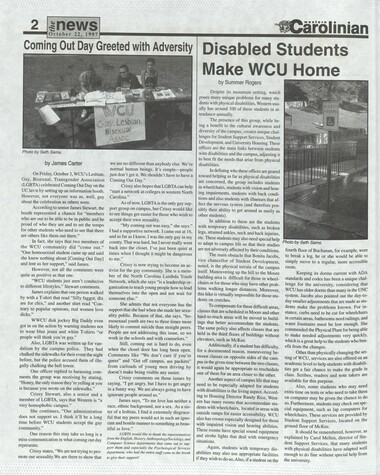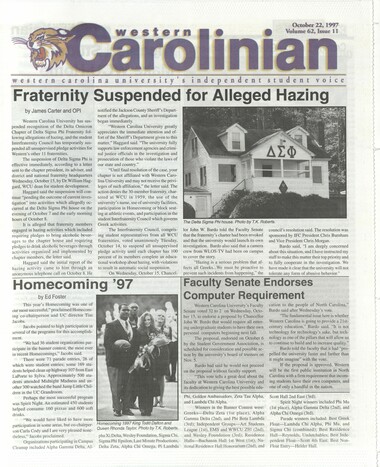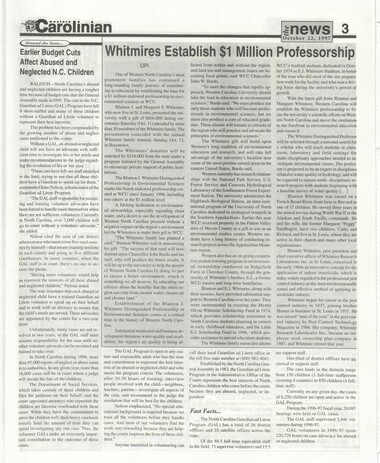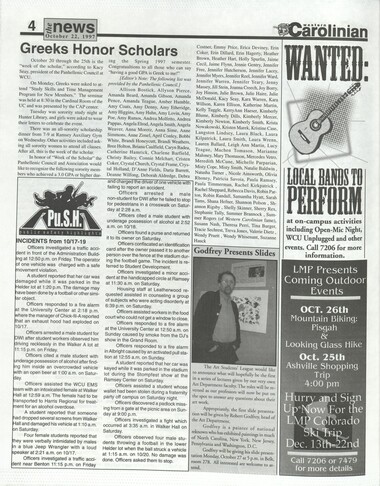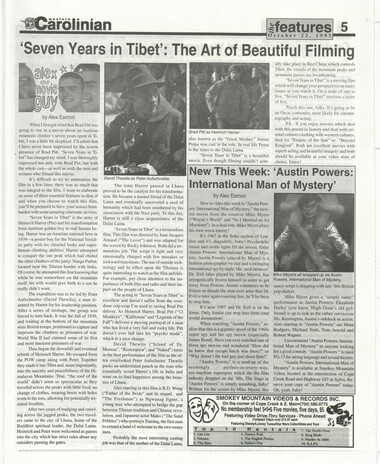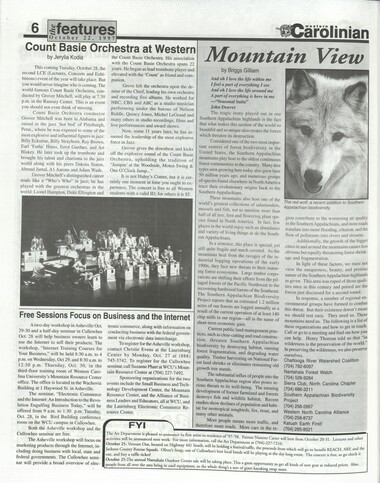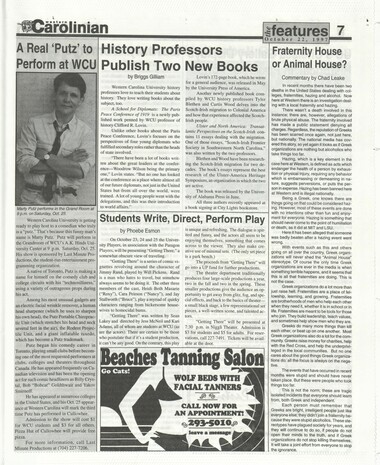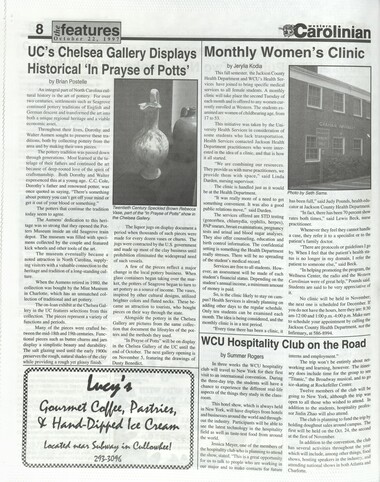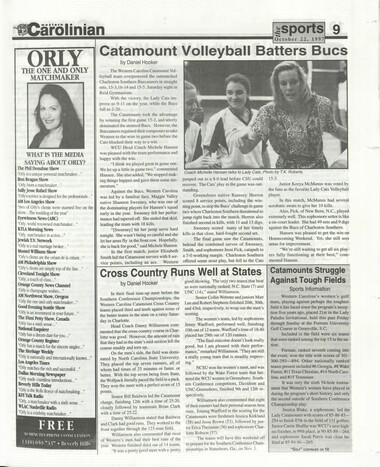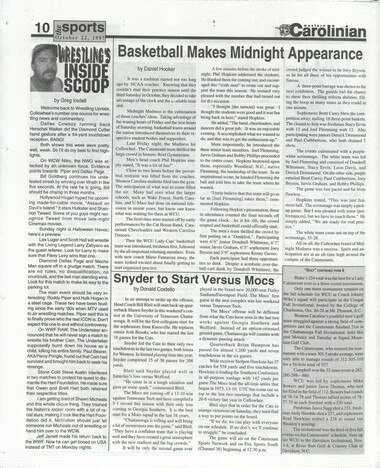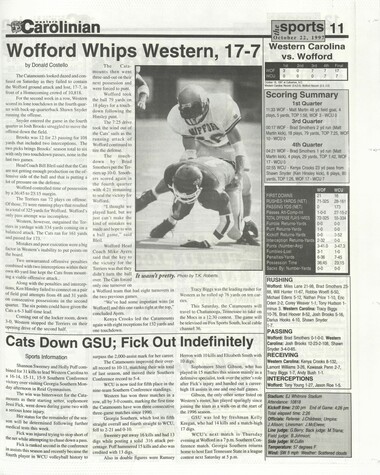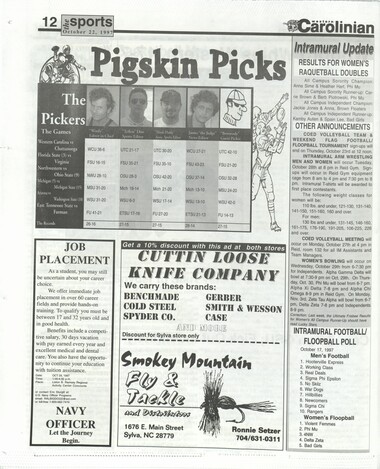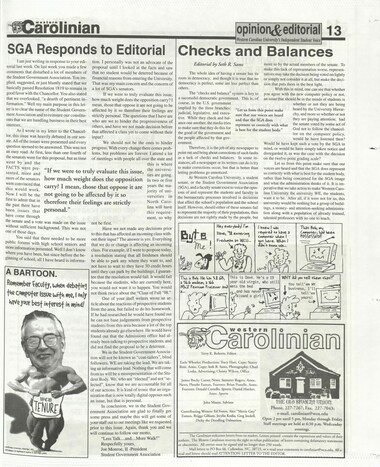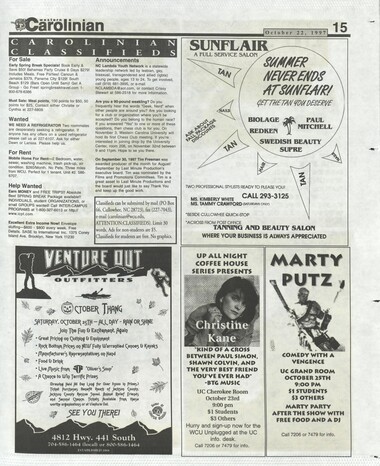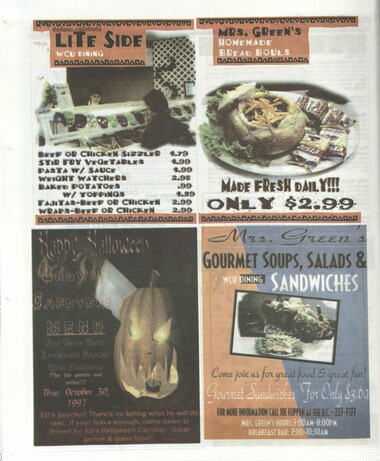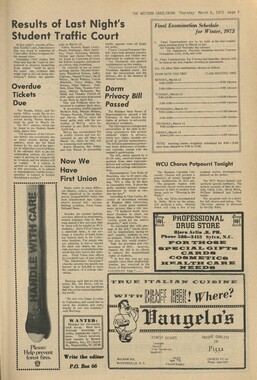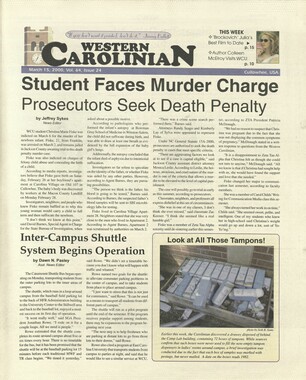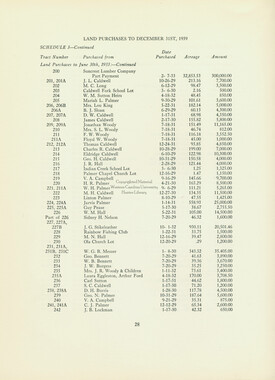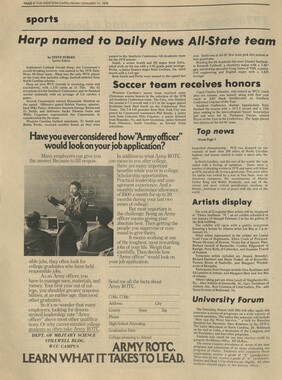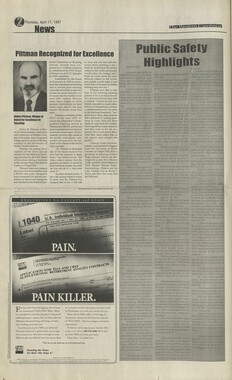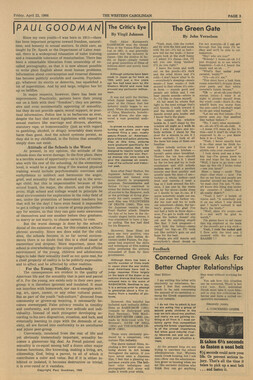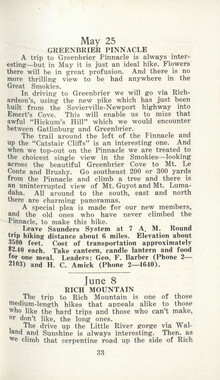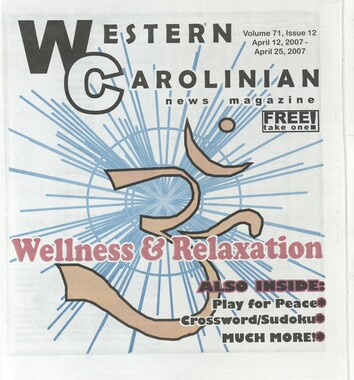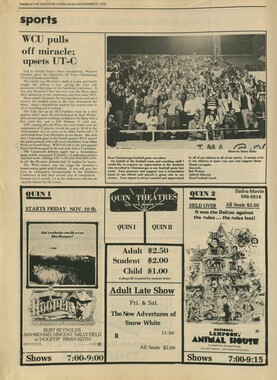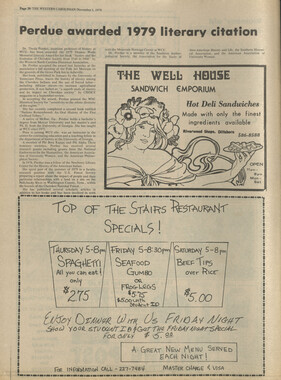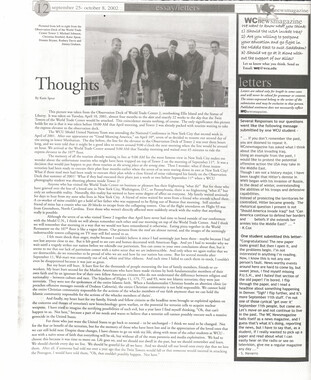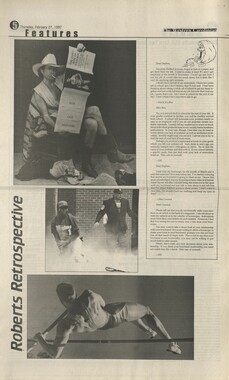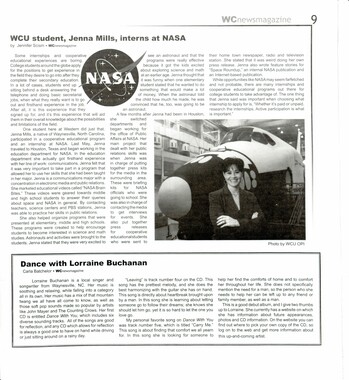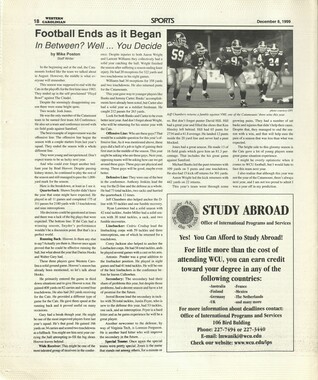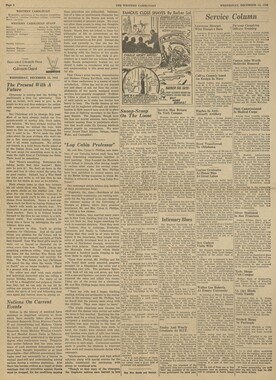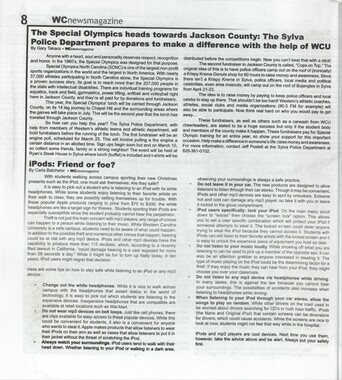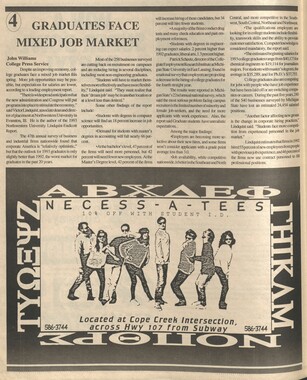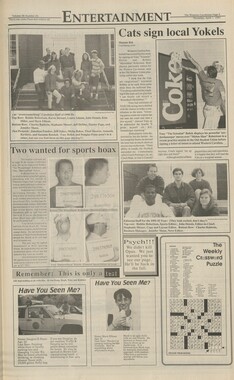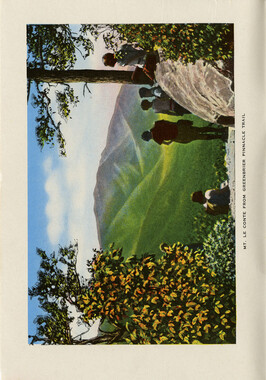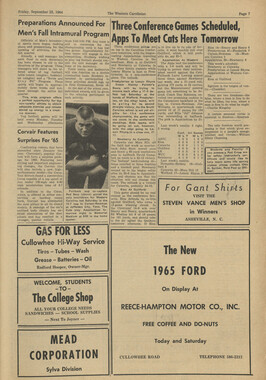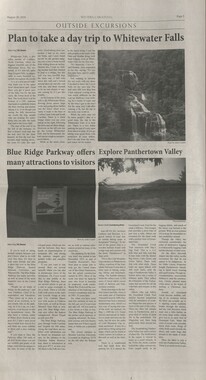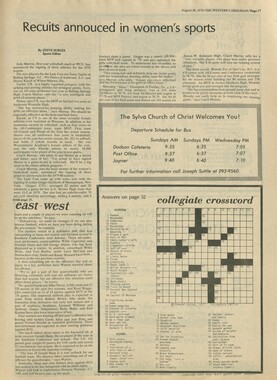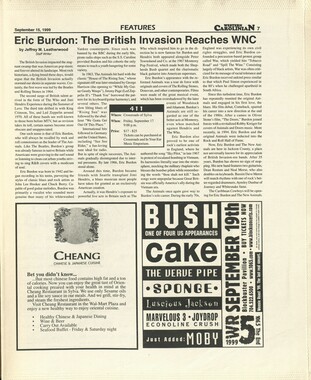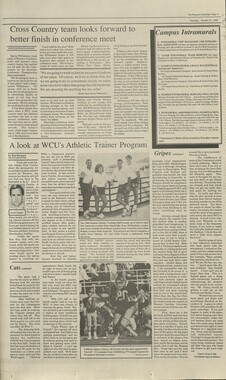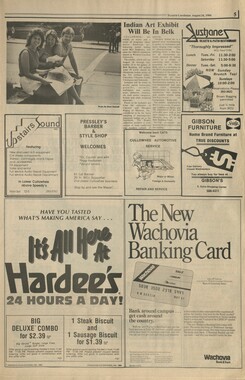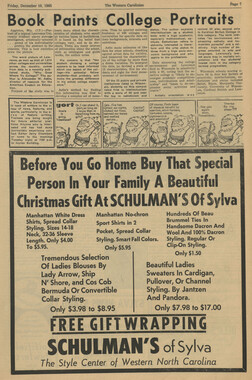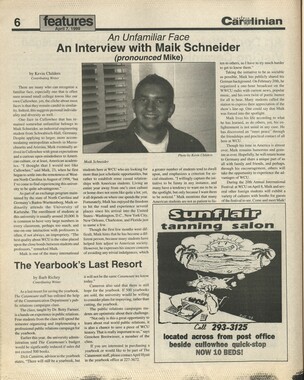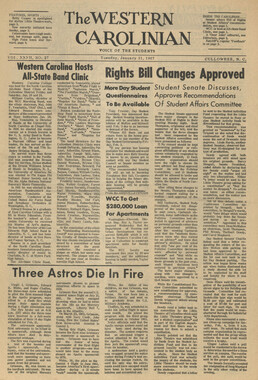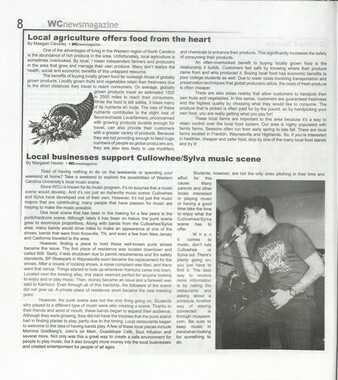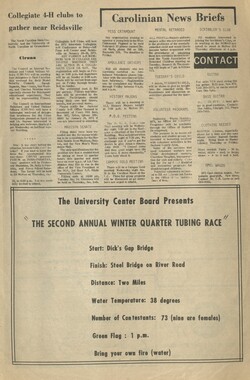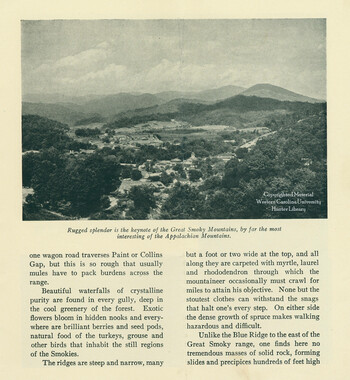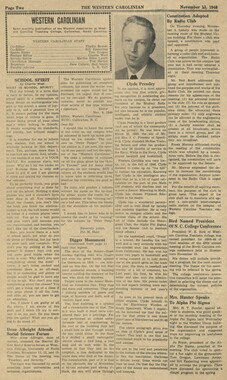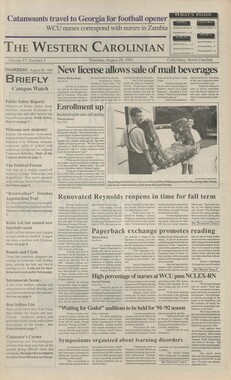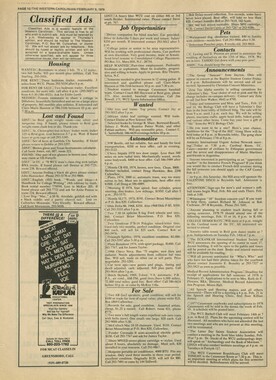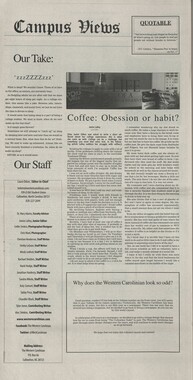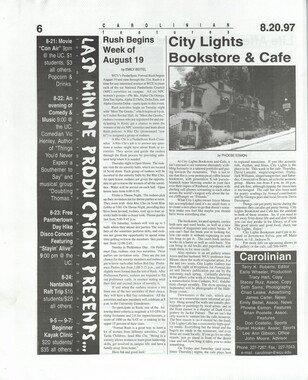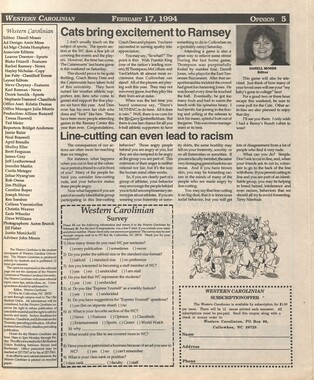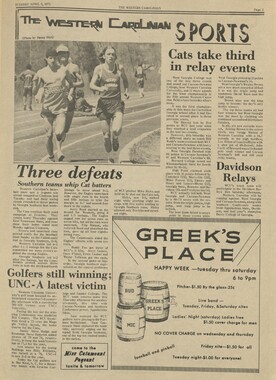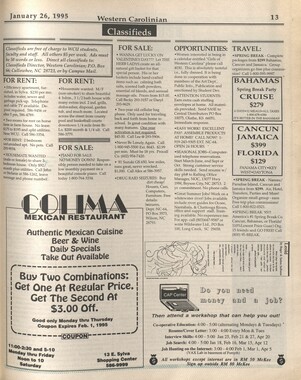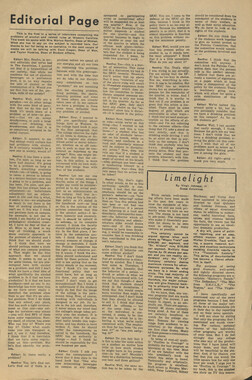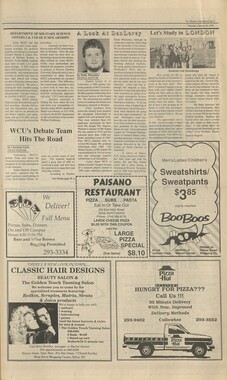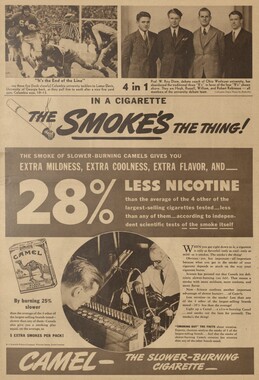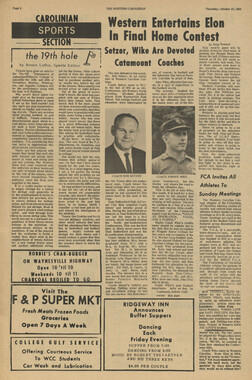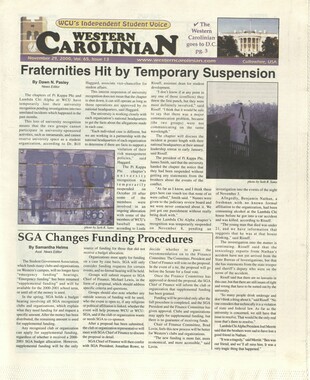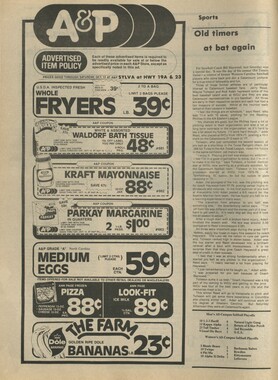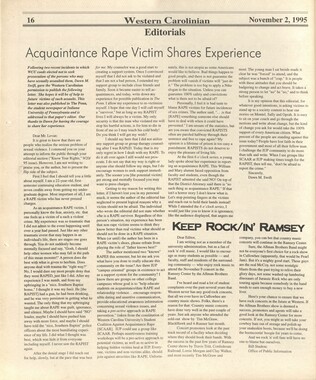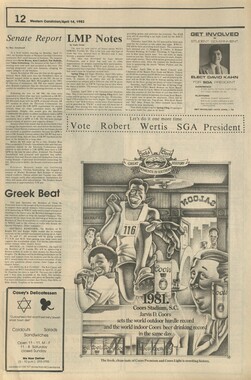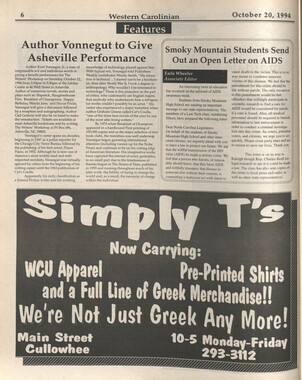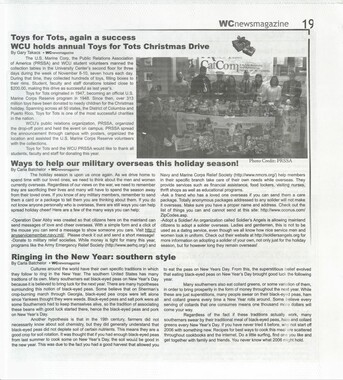Western Carolina University (21)
View all
- Canton Champion Fibre Company (2308)
- Cherokee Traditions (291)
- Civil War in Southern Appalachia (165)
- Craft Revival (1942)
- George Masa Collection (137)
- Great Smoky Mountains - A Park for America (3080)
- Highlights from Western Carolina University (422)
- Horace Kephart (973)
- Journeys Through Jackson (159)
- LGBTQIA+ Archive of Jackson County (89)
- Oral Histories of Western North Carolina (318)
- Picturing Appalachia (6617)
- Stories of Mountain Folk (413)
- Travel Western North Carolina (153)
- Western Carolina University Fine Art Museum Vitreograph Collection (129)
- Western Carolina University Herbarium (92)
- Western Carolina University: Making Memories (738)
- Western Carolina University Publications (2491)
- Western Carolina University Restricted Electronic Theses and Dissertations (146)
- Western North Carolina Regional Maps (71)
- World War II in Southern Appalachia (131)
University of North Carolina Asheville (6)
View all
- Allanstand Cottage Industries (62)
- Appalachian National Park Association (53)
- Bennett, Kelly, 1890-1974 (1463)
- Berry, Walter (76)
- Brasstown Carvers (40)
- Carver, George Washington, 1864?-1943 (26)
- Cathey, Joseph, 1803-1874 (1)
- Champion Fibre Company (233)
- Champion Paper and Fibre Company (297)
- Cherokee Indian Fair Association (16)
- Cherokee Language Program (22)
- Crowe, Amanda (40)
- Edmonston, Thomas Benton, 1842-1907 (7)
- Ensley, A. L. (Abraham Lincoln), 1865-1948 (275)
- Fromer, Irving Rhodes, 1913-1994 (70)
- George Butz (BFS 1907) (46)
- Goodrich, Frances Louisa (120)
- Grant, George Alexander, 1891-1964 (96)
- Heard, Marian Gladys (60)
- Kephart, Calvin, 1883-1969 (15)
- Kephart, Horace, 1862-1931 (313)
- Kephart, Laura, 1862-1954 (67)
- Laney, Gideon Thomas, 1889-1976 (439)
- Masa, George, 1881-1933 (61)
- McElhinney, William Julian, 1896-1953 (44)
- Niggli, Josephina, 1910-1983 (10)
- North Carolina Park Commission (105)
- Osborne, Kezia Stradley (9)
- Owens, Samuel Robert, 1918-1995 (11)
- Penland Weavers and Potters (36)
- Roberts, Vivienne (15)
- Roth, Albert, 1890-1974 (142)
- Schenck, Carl Alwin, 1868-1955 (1)
- Sherrill's Photography Studio (2565)
- Southern Highland Handicraft Guild (127)
- Southern Highlanders, Inc. (71)
- Stalcup, Jesse Bryson (46)
- Stearns, I. K. (213)
- Thompson, James Edward, 1880-1976 (226)
- United States. Indian Arts and Crafts Board (130)
- USFS (683)
- Vance, Zebulon Baird, 1830-1894 (1)
- Weaver, Zebulon, 1872-1948 (58)
- Western Carolina College (230)
- Western Carolina Teachers College (282)
- Western Carolina University (2008)
- Western Carolina University. Mountain Heritage Center (18)
- Whitman, Walt, 1819-1892 (10)
- Wilburn, Hiram Coleman, 1880-1967 (73)
- Williams, Isadora (3)
- Cain, Doreyl Ammons (0)
- Crittenden, Lorraine (0)
- Rhodes, Judy (0)
- Smith, Edward Clark (0)
- Appalachian Region, Southern (3032)
- Asheville (N.C.) (1945)
- Avery County (N.C.) (26)
- Blount County (Tenn.) (195)
- Buncombe County (N.C.) (1680)
- Cherokee County (N.C.) (283)
- Clay County (N.C.) (556)
- Graham County (N.C.) (238)
- Great Smoky Mountains National Park (N.C. and Tenn.) (525)
- Haywood County (N.C.) (3573)
- Henderson County (N.C.) (70)
- Jackson County (N.C.) (4925)
- Knox County (Tenn.) (35)
- Knoxville (Tenn.) (13)
- Lake Santeetlah (N.C.) (10)
- Macon County (N.C.) (421)
- Madison County (N.C.) (216)
- McDowell County (N.C.) (39)
- Mitchell County (N.C.) (135)
- Polk County (N.C.) (35)
- Qualla Boundary (982)
- Rutherford County (N.C.) (78)
- Swain County (N.C.) (2185)
- Transylvania County (N.C.) (270)
- Watauga County (N.C.) (12)
- Waynesville (N.C.) (86)
- Yancey County (N.C.) (72)
- Aerial Photographs (3)
- Aerial Views (60)
- Albums (books) (4)
- Articles (1)
- Artifacts (object Genre) (228)
- Bibliographies (1)
- Biography (general Genre) (2)
- Cards (information Artifacts) (38)
- Clippings (information Artifacts) (192)
- Copybooks (instructional Materials) (3)
- Crafts (art Genres) (622)
- Depictions (visual Works) (21)
- Design Drawings (1)
- Digital Moving Image Formats (2)
- Drawings (visual Works) (185)
- Envelopes (101)
- Exhibitions (events) (1)
- Facsimiles (reproductions) (1)
- Fiction (general Genre) (4)
- Financial Records (12)
- Fliers (printed Matter) (67)
- Glass Plate Negatives (381)
- Guidebooks (2)
- Internegatives (10)
- Interviews (823)
- Land Surveys (102)
- Letters (correspondence) (1045)
- Manuscripts (documents) (618)
- Maps (documents) (177)
- Memorandums (25)
- Minutes (administrative Records) (59)
- Negatives (photographs) (6090)
- Newsletters (1290)
- Newspapers (2)
- Notebooks (8)
- Occupation Currency (1)
- Paintings (visual Works) (1)
- Pen And Ink Drawings (1)
- Periodicals (194)
- Personal Narratives (10)
- Photographs (12977)
- Plans (maps) (1)
- Poetry (6)
- Portraits (4568)
- Postcards (329)
- Programs (documents) (181)
- Publications (documents) (2444)
- Questionnaires (65)
- Relief Prints (26)
- Sayings (literary Genre) (1)
- Scrapbooks (282)
- Sheet Music (2)
- Slides (photographs) (402)
- Songs (musical Compositions) (2)
- Sound Recordings (802)
- Specimens (92)
- Speeches (documents) (18)
- Tintypes (photographs) (8)
- Transcripts (329)
- Text Messages (0)
- A.L. Ensley Collection (275)
- Appalachian Industrial School Records (7)
- Appalachian National Park Association Records (336)
- Axley-Meroney Collection (2)
- Bayard Wootten Photograph Collection (20)
- Bethel Rural Community Organization Collection (7)
- Blumer Collection (5)
- C.W. Slagle Collection (20)
- Canton Area Historical Museum (2110)
- Carlos C. Campbell Collection (462)
- Cataloochee History Project (64)
- Cherokee Studies Collection (4)
- Daisy Dame Photograph Album (5)
- Daniel Boone VI Collection (1)
- Doris Ulmann Photograph Collection (112)
- Elizabeth H. Lasley Collection (1)
- Elizabeth Woolworth Szold Fleharty Collection (4)
- Frank Fry Collection (95)
- George Masa Collection (173)
- Gideon Laney Collection (452)
- Hazel Scarborough Collection (2)
- Hiram C. Wilburn Papers (28)
- Historic Photographs Collection (236)
- Horace Kephart Collection (861)
- Humbard Collection (33)
- Hunter and Weaver Families Collection (1)
- I. D. Blumenthal Collection (4)
- Isadora Williams Collection (4)
- Jesse Bryson Stalcup Collection (47)
- Jim Thompson Collection (224)
- John B. Battle Collection (7)
- John C. Campbell Folk School Records (80)
- John Parris Collection (6)
- Judaculla Rock project (2)
- Kelly Bennett Collection (1482)
- Love Family Papers (11)
- Major Wiley Parris Civil War Letters (3)
- Map Collection (12)
- McFee-Misemer Civil War Letters (34)
- Mountain Heritage Center Collection (4)
- Norburn - Robertson - Thomson Families Collection (44)
- Pauline Hood Collection (7)
- Pre-Guild Collection (2)
- Qualla Arts and Crafts Mutual Collection (12)
- R.A. Romanes Collection (681)
- Rosser H. Taylor Collection (1)
- Samuel Robert Owens Collection (94)
- Sara Madison Collection (144)
- Sherrill Studio Photo Collection (2558)
- Smoky Mountains Hiking Club Collection (616)
- Stories of Mountain Folk - Radio Programs (374)
- The Reporter, Western Carolina University (510)
- Venoy and Elizabeth Reed Collection (16)
- WCU Gender and Sexuality Oral History Project (36)
- WCU Mountain Heritage Center Oral Histories (25)
- WCU Oral History Collection - Mountain People, Mountain Lives (71)
- WCU Students Newspapers Collection (1923)
- Western North Carolina Tomorrow Black Oral History Project (69)
- William Williams Stringfield Collection (2)
- Zebulon Weaver Collection (109)
- African Americans (390)
- Appalachian Trail (35)
- Artisans (521)
- Cherokee art (84)
- Cherokee artists -- North Carolina (10)
- Cherokee language (21)
- Cherokee pottery (101)
- Cherokee women (208)
- Church buildings (190)
- Civilian Conservation Corps (U.S.) (111)
- College student newspapers and periodicals (2012)
- Dams (108)
- Dance (1023)
- Education (222)
- Floods (63)
- Folk music (1015)
- Forced removal, 1813-1903 (2)
- Forest conservation (220)
- Forests and forestry (1198)
- Gender nonconformity (4)
- Great Smoky Mountains National Park (N.C. and Tenn.) (181)
- Hunting (47)
- Landscape photography (25)
- Logging (122)
- Maps (83)
- Mines and mineral resources (9)
- North Carolina -- Maps (18)
- Paper industry (38)
- Postcards (255)
- Pottery (135)
- Railroad trains (72)
- Rural electrification -- North Carolina, Western (3)
- School integration -- Southern States (2)
- Segregation -- North Carolina, Western (5)
- Slavery (5)
- Sports (452)
- Storytelling (243)
- Waterfalls -- Great Smoky Mountains (N.C. and Tenn.) (66)
- Weaving -- Appalachian Region, Southern (280)
- Wood-carving -- Appalachian Region, Southern (328)
- World War, 1939-1945 (173)
Western Carolinian Volume 62 (63) Number 11
Item
Item’s are ‘child’ level descriptions to ‘parent’ objects, (e.g. one page of a whole book).
-
-
*> news October 22, 1997 Coming Out Day Greeted with Adversity Photo by Seth Sams by James Carter On Friday, October 3, WCU's Lesbian, Gay, Bisexual, Transgender Association (LGBTA) celebrated Coming Out Day on the UC lawn by setting up an information booth. However, not everyone was as, well, gay about the celebration as others were. According to senior James Stewart, the booth represented a chance for "members who are out to be able to be in public and be proud of who they are and to set the tempo for other students who need to see that there are others like them out there." In fact, she says that two members of the WCU community did "come out." "One homosexual student came up and said she knew nothing about [Coming Out Day] and lent us her support," said James. However, not all the comments were quite as positive as that one. "WCU students just aren't conducive to different lifestyles," Stewart comments. James explains that one person walked by with a T-shirt that read "Silly faggot, dix are for chix," and another shirt read "Contrary to popular opinions, real women love dicks." WWCU disk jockey Big Daddy even got in on the action by warning students not to wear blue jeans and white T-shirts "or people will think you're gay." Also, LGBTA was written up for vandalism by the campus police. They had chalked the sidewalks for their event the night before, but the police accused them of illegally chalking the bell tower. One officer replied to harassing comments the group was receiving by stating, "Honey, the only reason they're yelling at you is because you wrote on the sidewalks." Crissy Stewart, also a senior and a member of LGBTA, says that Western is "a very homophobic campus." She continues, "Our administration does not support us. I think it'll be a long time before WCU students accept the gay community." One reason this may take so long is a miss-communication in what coming out day represents. Crissy states, "We are not trying to promote our sexuality.We are there to show that we are no different than anybody else. We're normal human beings. It's simple—people just don't get it. We shouldn't have to have a Coming Out Day." Crissy also hopes that LGBTA can help "start a network at colleges in western North Carolina." As of now, LGBTA is the only gay support group on campus, but Crissy would like to see things get easier for those who wish to accept their own sexuality. "My coming out was easy," she says." I had a supportive network. I came out at 16, and as far as I knew, I was the only gay in my county. That was hard, but I never really went back into the closet. I've just been quiet at times when I thought it might be dangerous to me." Crissy is now trying to become an activist for the gay community. She is a member of the North Carolina Lambda Youth Network, which she says "is a leadership organization to teach young people how to lead themselves into the open and not wait for someone else." She admits that not everyone has the support that she had when she made her sexuality public. Because of that, she says, "homosexual youth are two to three times more likely to commit suicide than straight peers. People are not addressing this issue, so we work in the schools and with counselors." Still, coming out is hard to do, even when the closet door has long been open. Comments like "We don't care if you're queer" and "Get off campus, ass packers" from carloads of young men driving by doesn't make being visible any easier. Crissy comments on those issues by saying, "I get angry, but I have to get angry in a funny way. We are always going to have ignorant people around us." James says, "To me love has neither a race, ethnic background, nor a sex. As a sister of a lesbian, I find it extremely disgraceful that my peers would act in such an ignorant and hostile manner to something as beautiful as love." LGBTA would like to thank the representatives from the English, History, Anthropology/Sociology, and Computer Science departments that came out to support them and especially the Psychological Services department, who had the entire staff come to the booth to give their support! western ■• m arolmian Disabled Students Make WCU Home by Summer Rogers Despite its mountain setting, wnich poses many unique problems for many students with physical disabilities, Western usually has around 100 of these students in attendance annually. The presence of this group, while being a benefit to the cultural awareness and diversity ofthe campus, creates unique challenges for Student Support Services, Student Development, and University Housing. These offices are the main links between students witn disabilities and the campus, adjusting it to best fit the needs that arise from physical disabilities. In defining who these offices are geared toward helping as far as physical disabilities are concerned, the group includes students in wheelchairs, students with vision and hearing impairments, students with back conditions and also students with illnesses that affect the nervous system (and therefore possibly their ability to get around as easily as other students). In addition to these are the students with temporary disabilities, such as broken legs, strained ankles, neck and back injuries, etc. These students may also need special help to adapt to campus life so that their studies are not adversely affected by their conditions. The main obstacle that Bonita Jacobs, vice chancellor of Student Development, noted, is the physical terrain of the campus itself. Maneuvering up the hill to the Moore building area is difficult for those in wheelchairs or for those who may have other problems walking longer distances. Moreover, this hike is virtually impossible for those students on crutches. To compensate for these difficult areas, classes that are scheduled in Moore and other hard-to-reach areas will be moved to buildings that better accommodate the students. The same policy also affects classes that are held in the third floors of buildings without elevators, such as McKee. Additionally, if a student has difficulty, for a documented reason, maneuvering between classes on opposite sides of the campus in the given time between the two classes, it would again be appropriate to reschedule one of them for an area closer to the other. Another aspect of campus life that may need to be especially adapted for students with disabilities is the living aspect. According to Housing Director Randy Rice, Western has many rooms that accommodate students with wheelchairs, located in areas with outside ramps for easier accessibility. WCU also has rooms especially designed for those with impaired vision and hearing abilities. These rooms have special sound equipment and strobe lights that deal with emergency situations. Again, students with temporary disabilities may also use appropriate facilities if they wish to do so. Also, if a student on the Photo by Seth Sams. fourth floor of Buchanan, for example, were to break a leg, he or she would be able to simply move to a regular, more accessible room. Keeping its dorms current with ADA standards and codes has been a unique challenge for the university, considering that WCU has older dorms than many in the UNC system. Jacobs also pointed out the day-today smaller adjustments that are made as students make the problems known. For instance, curbs need to be cut for wheelchairs in certain areas, bathrooms need railings, and water fountains must be low enough. She commended the Physical Plant for being able to make needed adjustments very quickly, which is a great help to the students who benefit from the changes. Other than physically changing the setting of WCU, services are also offered on an academic level to help students with disabilities get a fair chance to make the grade in class. Scribes, readers and note takers are available for this purpose. Also, some students who may need extra time on tests or who need to take them on computer may be given the chance to do so. Furthermore, students may check out special equipment, such as lap computers for wheelchairs. These services are provided by Student Support Services, located on the ground floor of McKee. It should be remembered, however, as explained by Carol Mellen, director of Student Support Services, that many students with physical disabilities have adapted well enough to do fine without special help from the university.
Object
Object’s are ‘parent’ level descriptions to ‘children’ items, (e.g. a book with pages).
-
The Western Carolinian is Western Carolina University's student-run newspaper. The paper was published as the Cullowhee Yodel from 1924 to 1931 before changing its name to The Western Carolinian in 1933.
-
